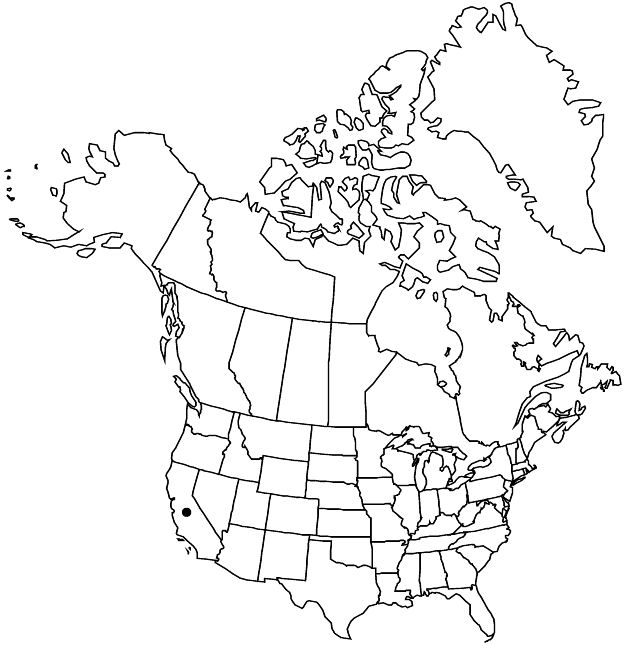Difference between revisions of "Horkelia truncata"
in N. L. Britton et al., N. Amer. Fl. 22: 274. 1908.
FNA>Volume Importer |
FNA>Volume Importer |
||
| Line 32: | Line 32: | ||
|distribution=Calif.;Mexico (Baja California). | |distribution=Calif.;Mexico (Baja California). | ||
|discussion=<p>Of conservation concern.</p><!-- | |discussion=<p>Of conservation concern.</p><!-- | ||
| − | --><p>Horkelia truncata is confined to the Peninsular Ranges of San Diego County, California, and northern Baja California, Mexico. Plants of the species are unusual in Horkelia in that the terminal leaflet is usually notably larger than the lateral leaflets, unlobed, and distinct, rather than confluent with the distal lateral ones.</p> | + | --><p><i>Horkelia truncata</i> is confined to the Peninsular Ranges of San Diego County, California, and northern Baja California, Mexico. Plants of the species are unusual in <i>Horkelia</i> in that the terminal leaflet is usually notably larger than the lateral leaflets, unlobed, and distinct, rather than confluent with the distal lateral ones.</p> |
|tables= | |tables= | ||
|references= | |references= | ||
| Line 56: | Line 56: | ||
|publication year=1908 | |publication year=1908 | ||
|special status=Conservation concern | |special status=Conservation concern | ||
| − | |source xml=https://jpend@bitbucket.org/aafc-mbb/fna-data-curation.git/src/ | + | |source xml=https://jpend@bitbucket.org/aafc-mbb/fna-data-curation.git/src/8f726806613d60c220dc4493de13607dd3150896/coarse_grained_fna_xml/V9/V9_402.xml |
|subfamily=Rosaceae subfam. Rosoideae | |subfamily=Rosaceae subfam. Rosoideae | ||
|tribe=Rosaceae tribe Potentilleae | |tribe=Rosaceae tribe Potentilleae | ||
Revision as of 18:16, 18 September 2019
Plants tufted, green. Stems erect, 2–6(–8) dm, hairs spreading. Basal leaves planar, 4–13 × 2–3.5(–4) cm; stipules entire or basally lobed; leaflets 1–3 per side, separate, oblong to obovate, 10–30 × 5–12(–15) mm, ± 1/2 as wide as long, divided 1/6–1/4 to midrib into (15–)20–30 acute to obtuse teeth, sparsely short-pilose to glabrate, especially adaxially. Cauline leaves 4–7. Inflorescences open, flowers arranged individually. Pedicels 4–20(–30) mm. Flowers 12–17 mm diam.; epicalyx bractlets broadly ovate, 3–4.5 × 2–3 mm, ± 2/3 length of sepals, entire; hypanthium 1.5–2 × 5–8 mm, less than 1/2 as deep as wide, interior glabrous; sepals ± reflexed, broadly ovate, 3.5–5.5 mm; petals obovate to round, 5–7 × (3–)4–7 mm, apex ± rounded; filaments 1–2 × 0.5–2 mm, anthers 0.8–1 mm; carpels 50–80; styles 1.5–3 mm. Achenes brown, 1.3–1.5 mm, smooth.
Phenology: Flowering summer.
Habitat: Dry clay soil, in chaparral communities, oak woodlands
Elevation: 400–1300 m
Distribution

Calif., Mexico (Baja California).
Discussion
Of conservation concern.
Horkelia truncata is confined to the Peninsular Ranges of San Diego County, California, and northern Baja California, Mexico. Plants of the species are unusual in Horkelia in that the terminal leaflet is usually notably larger than the lateral leaflets, unlobed, and distinct, rather than confluent with the distal lateral ones.
Selected References
None.